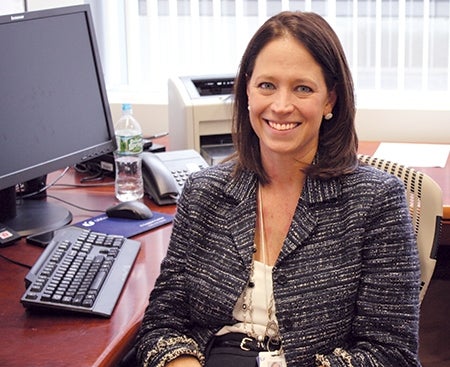A West Coast native and UCLA graduate, Dr. Jennifer LaFemina completed her medical training at world-class healthcare institutions on the East Coast, including a general surgery residency at Massachusetts General Hospital in Boston and a surgical oncology fellowship at Memorial Sloan Kettering Cancer Center in New York City. When presented with job opportunities, she was compelled to join the Division of Surgical Oncology at UMass Memorial Medical Center in Worcester in 2012.
A Southborough resident, LaFemina has honed her specialities in the last six years, focusing primarily on breast and skin cancer surgery. She’s also the residency director for the hospital’s general surgery residency program.
Why did you become a doctor?
I really do think that medicine is a very special little area where we’re given this privilege to take care of patients. I mean, how many jobs can you have where somebody who doesn’t even know you walks in and tells you their life story? I really value having that relationship.
And why did you decide to focus on breast cancer surgery?
I learned over the course of my training that I was somebody who really needed to have a relationship with a patient. I recognized a lot of the satisfaction I get comes from helping patients navigate that very difficult time around the time of the diagnosis.
The breast cancer population is very special, I find. It’s generally a very educated population who is scared and anxious, yet proactive and I just find particular satisfaction in that group. It’s also a very academic topic. While there have been so many advances in breast cancer, there are still so many to go.
How did you land at UMass Memorial Medical Center?
I was struck, both from my time interviewing but also from the folks I already knew here, by the patient-centered collaboration. Sometimes folks can lose sight of the patient as the focus of why we’re here every single day. I was struck by the fact that all caretakers, no matter their role, are all about the patient.
Breast cancer treatment has come a long way. What is the new frontier?
In the past, every patient with breast cancer underwent complete removal of every lymph node in the armpit. The problem it can lead to arm swelling, which can be quite debilitating. Then a study came out showing us we don’t necessarily need to do that operation, and still have the same survival outcome. But many women elect to have a mastectomy, and in that situation we still don’t have that answer. Here, we’re running a trial, called the Alliance Trial, where we’re actually looking at that topic to see if we can find similar data that’s going to allow women to avoid that surgery.
Many believe that immunotherapy, which uses biologic agents to target cancer cells very specifically, is really going to be the way of the future. We’ve seen this in melanoma. No one’s really looked at that in breast cancer yet. We are really fortunate here to have the Avatar Institute. We have the opportunity to grow breast cancer in humanized mice and treat it with these novel agents trying to bring targeted treatments to the clinic quicker than we could accomplish otherwise in a trial.
The overall survival rate for breast cancer is more than 90 percent for cancers found early. What’s behind the high cure rate?
The incidence went down for a while, and then in the mid-2000s it kind of leveled out. The death rate’s improving. Two main things have occurred in the last 20 to 30 years that have reduced mortality. One is better screening. The second thing is more targeted treatments.
How do you spend your time when you’re not in the operating room?
I have a true passion for creating and helping develop competent surgeons in the modern world. One of the things we’re really trying to bring to surgical training is this concept of wellbeing, which I think is important to patient care also. Developing residents who are able to be resilient and combat burnout, not only is better for them, but will lead to better patient satisfaction also.
When I’m not here, I have a three-year-old and a one-and-a-half-year old who keep me busy.
This interview was conducted and edited for length and clarity by Emily Micucci, Central Massachusetts Health editor.

